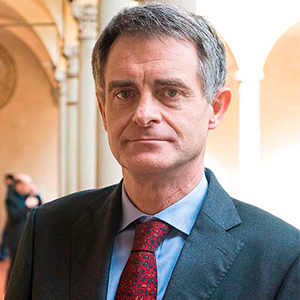In development

Ilaria Conti
Head of the Gas, Hydrogen and Decarbonisation area at the Florence School of Regulation
Ilaria Conti is Head of the Gas, Hydrogen and Decarbonisation area at the Florence School of Regulation.
She has worked in EU energy policy and regulation for 15+ years, of which 9 in Brussels. She worked for the United Nations (UNRIC), the Permanent Representation of Italy at the Europe Union (EU) and the European Federation of Energy Traders (EFET), as Communications and Policy Associate. In 2008 she founded EFET Italy, which she headed until 2013.
She joined the European University Institute in 2015 as Energy Policy Deputy to the Director; there she founded the Gas area of the Florence School of Regulation, initiating and leading since then its research, training and policy debate activities.
She currently directs and teaches in residential and online courses on gas policy and regulation; she authored or co-authored articles and publications on natural gas and, more recently, hydrogen, gas markets decarbonisation and gas storage.
Energy Transition (E)
- Level 5: Ichma room 2
- Save to Google Calendar
- Save to My Agenda
Energy Transition (E)
- Level 6 : Pachacamac room
- Save to Google Calendar
- Save to My Agenda
Market integration of renewable energies
This training module will explore the impact of a greater penetration of renewables on the electricity systems and markets.
Competitiveness (C)
- Level 6 : Pachacamac room
- Save to Google Calendar
- Save to My Agenda
Ensuring reliable utilities - Houston do we have a problem?
Every year, electric and gas utilities' assets are threatened by the impact of climate change, and cybersecurity attacks...
High Level Round Table D: Regulating the nascent hydrogen sector
Energy Transition (E)
- Level 5: Ichma room 2
- Save to Google Calendar
- Save to My Agenda
 Alberto Pototschnig
Alberto Pototschnig
 Ilaria Conti
Ilaria Conti
Market integration of renewable energies
Energy Transition (E)
- Level 6 : Pachacamac room
- Save to Google Calendar
- Save to My Agenda
DESCRIPTION:
This training module will explore the impact of a greater penetration of renewables on the electricity systems and markets. The module will start with a characterisation of the different types of renewable-based generation, in terms of their variability, predictability and dispatchability, as well as their cost structures. The technical characteristics of renewable-based generation will be used to assess the way in which its development impacts the electricity system and the effect on the residual load, with the resulting need for greater system flexibility. Moreover, the impact of the different locations of renewables with respect to conventional generation on the power flows on the system will be explored and the resulting issues (e.g. loop-flows) highlighted.
On the other hand, the economic characteristics of renewable-based generation will be used to assess the way in which their development affects electricity markets in their different designs. The module will also consider how to deal with excess renewable-based generation and how to ensure sufficient back-up capacity. The module will conclude by presenting a taxonomy of the different phases in the integration of renewable-based generation in developing and mature markets, as well as real-life examples of approaches to overcome grid-related and market-related challenges.
 Pedro Verdelho
Pedro Verdelho
 Alberto Pototschnig
Alberto Pototschnig
 Ilaria Conti
Ilaria Conti
Ensuring reliable utilities - Houston do we have a problem?
Competitiveness (C)
- Level 6 : Pachacamac room
- Save to Google Calendar
- Save to My Agenda
DESCRIPTION:
Every year, electric and gas utilities' assets are threatened by the impact of climate change, and cybersecurity attacks. This poses substantial long-term risks to the reliability of utility service, also to public safety. This panel will explore how energy utilities and regulators can take a broad view of vulnerabilities and use collaboration, creativity, and resilience to overcome these challenges.
KEY QUESTIONS:
1) What are the essential resilience requirements for a rapidly evolving grid?
2) What is the regulator’s role?
3) How can we increase Distributed Generation while improving its resilience?
 Christian Zinglersen
Christian Zinglersen
 Ilaria Conti
Ilaria Conti
 Hugo Pérez
Hugo Pérez
 David Morton
David Morton
 Erin Hammel
Erin Hammel
